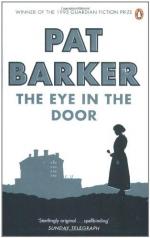|
This section contains 2,072 words (approx. 7 pages at 300 words per page) |

|
SOURCE: "Invalided Home," in London Review of Books, Vol. 15, No. 20, October 21, 1993, p. 22.
In the following positive review of The Eye in the Door, Birch describes the novel as "a continuation, and an enrichment, of Regeneration."
Working-class memory generated Pat Barker's writing. Her early fiction presented itself as a tribute to generations of suffering and survival in the industrial North-East of England. It seemed to fall into a ready-made tradition: 'the grit, the humour, the reality of working-class life', Virago burbled cheerfully about Union Street (1982). But there was more to Barker's work than that. Alongside the realism of her accounts of deprivation among the back streets was an intense imaginative inwardness. The lives she recounted were haunted, not only by the shared grind of poverty, but by private images of loss and love. There was a political edge to those novels, emerging as they did from the feminist Left...
|
This section contains 2,072 words (approx. 7 pages at 300 words per page) |

|


